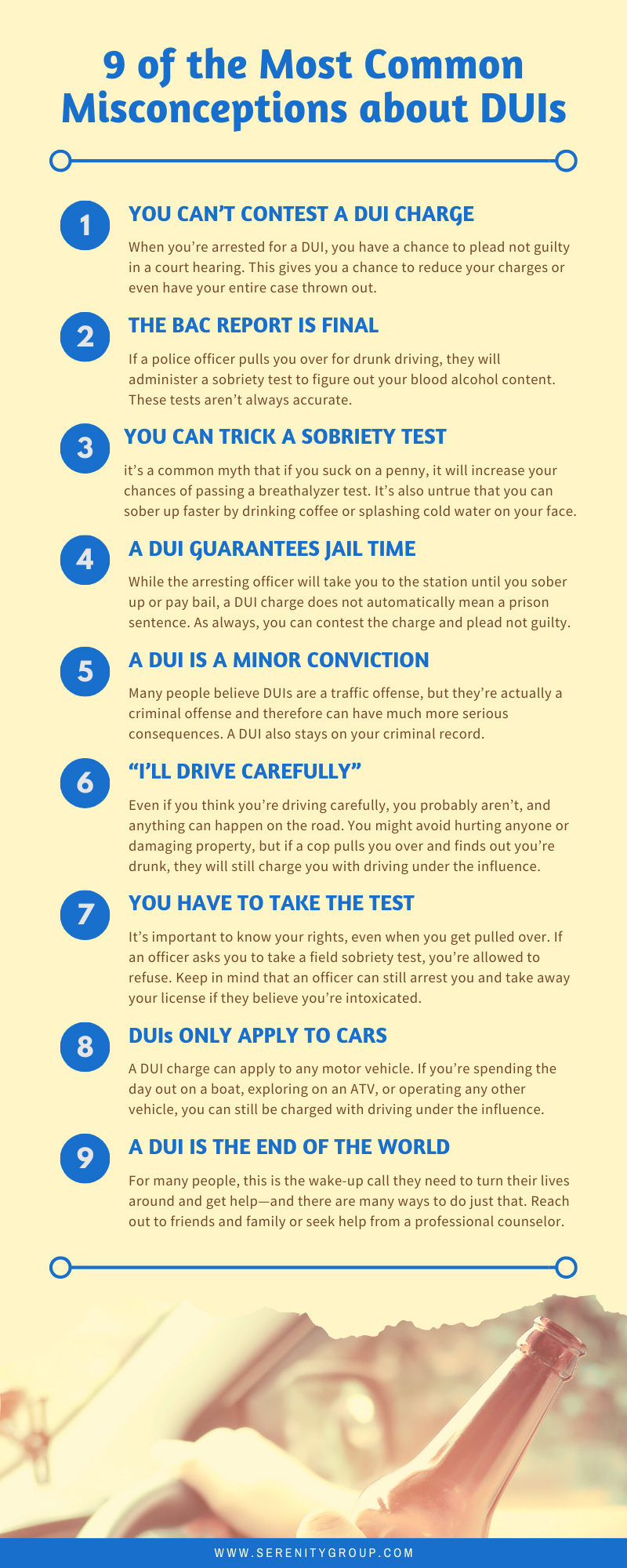9 of the Most Common Misconceptions about DUIs

A DUI charge, also known as driving under the influence, is a serious offense that can majorly impact on your life. However, there are a lot of myths that surround drunk driving charges. If you find yourself in a situation involving a DUI, it’s important that you know the difference between fact and fiction. Stay knowledgeable and informed with these common misconceptions about DUIs.
You Can’t Contest a DUI Charge
Dealing with the law can be tricky, and it’s easy to think that a DUI charge automatically means you’re guilty. If an officer suspects you of driving under the influence, they’ll arrest you and hold you at the station until you sober up or pay bail—but this is not actually a conviction. When you’re arrested for a DUI, you have a chance to plead not guilty in a court hearing. This gives you a chance to reduce your charges or even have your entire case thrown out. You are not convicted of a DUI until you either lose or fail to show up at your hearing.
The BAC Report is Final
If a police officer pulls you over for drunk driving, they will administer a sobriety test to figure out your blood alcohol content. This will likely include blowing into a breathalyzer, which measures chemical content in the breath to estimate your blood alcohol content. These tests aren’t always accurate. Because breathalyzers don’t measure the amount of alcohol in the bloodstream, they can guess your current blood alcohol content. Other factors, such as human error and certain medical conditions, can also result in inaccurate results. Without a blood test, there’s no way to accurately determine your blood alcohol content.
You Can Trick a Sobriety Test
While breathalyzers and other field sobriety tests don’t always give accurate results, that doesn’t mean you can trick them into giving a false negative. For example, it’s a common myth that if you suck on a penny, it will increase your chances of passing a breathalyzer test. This is false. It’s also untrue that you can sober up faster by drinking coffee or splashing cold water on your face. These tricks might make a sober person more alert, but they do nothing to help alcohol impairment. Time is the only real way to sober up, and the only guaranteed way to avoid a DUI is to not drink and drive.
A DUI Guarantees Jail Time
While the arresting officer will take you to the station until you sober up or pay bail, a DUI charge does not automatically mean a prison sentence. As always, you can contest the charge and plead not guilty—if you succeed, you’ll avoid jail time altogether. However, depending on where you live, jail time is still a possibility if you’re found guilty. Many states have mandatory minimum sentences for DUIs, and some have a prison sentence—even for first-time offenders. Nonetheless, a DUI charge is not a guaranteed prison sentence. From alternatives such as community service or alcohol education programs, it’s worth carefully considering your options during your court case.
A DUI is a Minor Conviction
While you might not necessarily go to prison for a DUI, it’s also not something you should take lightly. Many people believe DUIs are a traffic offense, but they’re actually a criminal offense and therefore can have much more serious consequences. Even with no previous criminal record, a DUI conviction can lead to a suspended license, steep fines, and potential jail time. A DUI also stays on your criminal record, which means that it can still cause you problems years after the conviction.
“I’ll Drive Carefully”
One of the most common misconceptions about DUIs is also one of the most dangerous: many people believe they can still get behind the wheel after a few drinks as long as they drive carefully. What they forget is that alcohol impairs your judgment as well as your vision, coordination, and reaction time. Even if you think you’re driving carefully, you probably aren’t, and anything can happen on the road. You might avoid hurting anyone or damaging property, but if a cop pulls you over and finds out you’re drunk, they will still charge you with driving under the influence.
You Have to Take the Test
It’s important to know your rights, even when you get pulled over. If an officer asks you to take a field sobriety test, you’re allowed to refuse. Depending on your state, you might also be able to refuse a breathalyzer test. Keep in mind that an officer can still arrest you and take away your license if they believe you’re intoxicated. Additionally, the fact that you refused a test might be used against you in a court hearing. Know your rights and the rules in your state so you can make the best judgment call if the need arises.
DUIs Only Apply to Cars
When you think of a DUI, there’s a good chance cars come to mind. Yet a DUI charge can apply to any motor vehicle. If you’re spending the day out on a boat, exploring on an ATV, or operating any other vehicle, you can still be charged with driving under the influence. This is why it’s important to have a sober driver, no matter where you go or how you plan on getting there.
A DUI is the End of the World
Admittedly, a DUI conviction can seem pretty bleak. Between the fines, possible jail time, and losing your driving privileges, a DUI greatly affects your life. However, these charges don’t have to ruin everything. For many people, this is the wake-up call they need to turn their lives around and get help—and there are many ways to do just that. Reach out to friends and family or seek help from a professional counselor. You can also get help with the more technical side of things. There are many companies, such as Serenity Group, that are here to advocate for you throughout the entire process. If you need SR22 insurance in Washington or any of our other service areas, Serenity Group has the tools to help you figure out the best solution for your situation. With the right help and information, you can make it through this process and return to your normal life.


Recent Comments